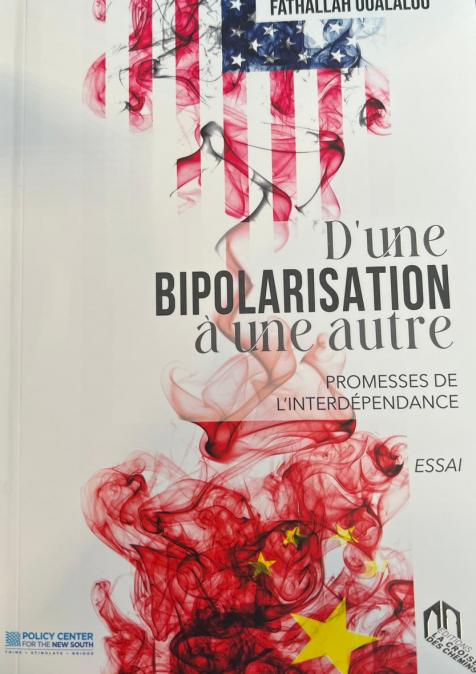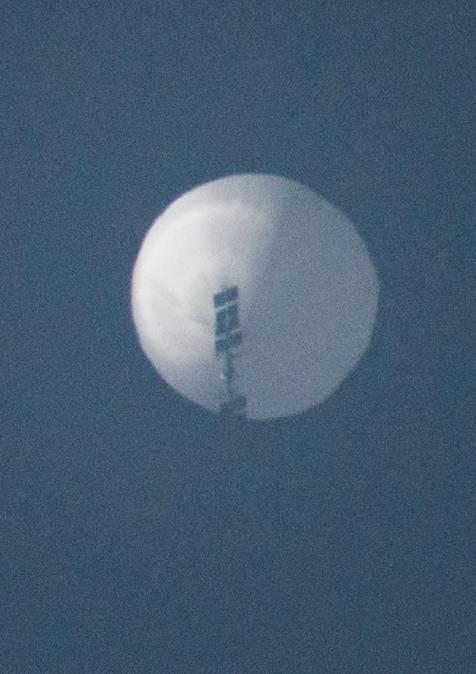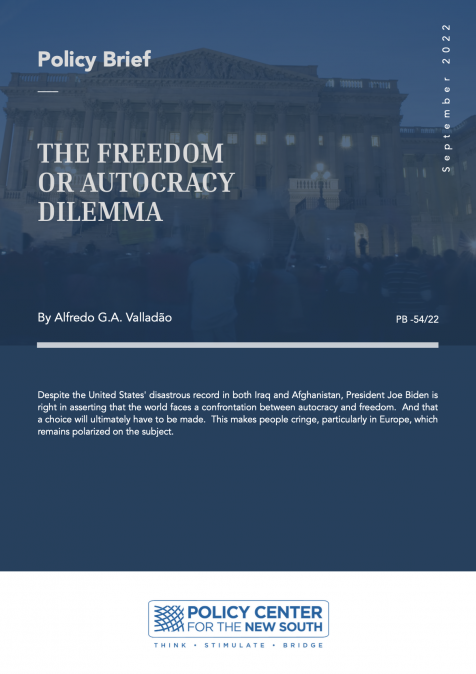Publications /
Opinion
The Soviet crew faced death in the depth of the Caribbean. Their submarine of the diesel powered “Foxtrott” class, registered as “B -52”, had been transformed into a gigantic metal coffin. It was in October 1962, the month when the world stopped breathing. The end, nuclear war, seemed near. Human civilization has never faced such an APOCALYPSE in history. The unthinkable was likely to happen. Washington and Moscow, here the leaders of the free capitalistic world, and there the representatives of Communism determined to spread their political gospel and military power, were ready to destroy the world for a handful of Soviet nuclear missiles stationed secretly on Cuban soil, just 300 miles away from the United States.
Slowly the Soviet naval war machine approached Cuba, which was surrounded by heavily armed US navy airplane carriers and destroyers, ready to expedite the enemy into the deep darkness of the ocean. Four Soviet submarines were detected and the Americans were sinking nonlethal depth charges onto their suspected positions. The Russian crew did not know whether the enemy was just trying to force their ship onto the surface, or if it was ready to kill. Their destruction seemed near, with a death in tropical waters on this historic day, October 27th. Arthur Schlesinger, historian and advisor of President John F. Kennedy, said that this confrontation on the high sea was the “most dangerous moment in human history.” The communication system of the submarine remained silent. High levels of carbon dioxide filled the narrow hull, and the screaming thunder of exploding charges shocked the crew. The soldiers were doomed, just like the world above. Their captain Valentin Grogrievitch Savitzky was determined to react and to resist.
He had one available torpedo: 10 to 15 kilotons, equivalent to the destructive force of the American bombs which destroyed Hiroshima and Nagasaki on August 9th 1945. It was the first nuclear attack in history, a military madness, an act against humanity. The submarine commander encouraged his crew: “we are going to blast them now. We will die, but we will sink them all-we will not become the shame of our fleet”. The captain didn’t need the order from his superiors, the deadly destructive system was ready to be launched, it was approved by Moscow prior to facing the enemy. The three senior officers on board just had to agree that the launch was urgent and justified. One man resisted, the flotilla commander Vasil Alexandrovich Arkhipov, who had survived a nuclear incident and radiation on another sub years before. Apparently the three officers fought verbally and shouted while, on the surface, the world collectively stopped breathing for a week, expecting the unavoidable nuclear exchange and the beginning of the third world war. Soviet ships moved slowly towards the naval blockade. On global radio stations, including the American Forces Network, commentators were counting minutes and seconds until the ships would face each other, cross the Rubicon, and initiate a nuclear blast, and the moment where a hundred mushroom-like clouds would darken the sky and the spirit of mankind. The world would be covered by an unimaginable and horrendous nuclear winter, never experienced by mankind but predicted by scientists -perhaps million survivors of the big bang of a different kind, perishing from hunger and radioactive contamination, resulting in cancer and slow death. Soot and smoke from the firestorm would loft high in the atmosphere, cooling, darkening and drying the earth. For decades, forever, who knows?
Arkhipov succeeded in calming the captain. The torpedo was never fired. Unknown to Washington and Moscow, the “B 52” crew and its commander were seconds away from annihilating the world and turning history and civilization into nuclear dust. For decades, the hero, the unknown officer of the Soviet submarine, was forgotten, and had not even a footnote in a tense conflict known as the Cold War. More than half a century later, in 2017, an American intellectual think tank, the Boston based “Future of Life Institute”, honored the Russian officer with an award, worth 50 000 US dollars, given to his daughter and grandson. The hero, who retired as a vice admiral, died in 1998 (he was born in 1926).
The world seemed peaceful for a while: no nuclear showdowns, just a few and often secret scrimmages. Now, alas, history is repeating itself. The shadow of nuclear conflict is darkening the political debate. Headlines warn of another cold war, certainly a time of politic-military crisis, not seen in decades. An American President threatens to destroy a nuclear armed nation, North Korea. Its self- asserted leader, the paunchy Mr. Kim-Jong-Un promises to hit American cities with his nuclear armed ballistic missiles. Russia, supporting the devastating inhuman war in Syria, is modernizing its nuclear arsenal. Its president announced in his annual state of the union address, just a few weeks prior to the election (which Putin won with 76.6 percent of the vote). His message was clear: Russia could handle any challenge. New nuclear powered cruise missiles were ready, and a laser weapon, a nuclear powered underwater drone and a hypersonic missile are now part of the Moscow arsenal. No one would be allowed to underestimate neither Vladimir Putin, nor the great Russian nation and its renewed glorious Armed Forces. The nationalist Russia dreams that the almighty Soviet empire would return, supported by superior nuclear strength.
In December, the Russian “Levada center”, an independent research organization, released a poll saying that 72 percent of Russians are convinced that their country is a “great power.” Trump, never short of exaggerations and bombastic statements either, announced to the world (and to his right wing electorate), that he would react to the Moscow threat and arm the United States as never before (all for just a few, cool 678 billion dollars in the 2019 budget). The cold war suddenly reappeared, with NATO expending its military might towards the Russian borders and Moscow occupying Crimea and destabilizing Ukraine. There is also the suspected, even proven, interference in American election, orchestrated by allies of Putin, officially private citizens, who apparently just have fun manipulating the world and causing chaos and confusion. Did Putin react and stop their actions? Is Russia murdering troublesome citizens abroad, using a Russian made military nerve agent to poison a former spy and his daughter, or choosing radioactive substances to murder other dissidents and critics escaping to the United Kingdom for safety?
At the same time Israel, a nuclear power, points to Teheran as another threat to world peace, accusing the enemy of secret but unproved development of nuclear weapons. The crown prince of Saudi Arabia, just visiting the USA for two weeks, declared on US TV that his country would certainly arm itself with nuclear weapons as well, if Iran should turn into a nuclear threat. NATO concluded, or rather understated, that the prospects for disarmament “are not favorable today.” Of an estimated 15 000 nuclear warheads ready for deployment, 14 000 are controlled by Moscow and Washington, two powers who continue to modernize their arsenals out of fear to be outmaneuvered by their enemies. Russia is planning to build more than a dozen ballistic missile armed submarines, as well as cruise missiles, with a range of 4500 kilometers, road- mobile intercontinental ballistic missiles, rail- mobile IBMs, and heavy silo based ICSMs. The RS-26 “Rubesz” is armed with independently guided warheads, designed to break through missile defense shields. Washington’s undersecretary of Defense for Policy, John Rood, warned: “while China and Russia are the greatest challenges, it’s not as if the rest of the world is a vast reservoir of peace. We must also simultaneously strengthen our efforts to deter and counter the clear and present dangers posed by rogues regimes such as North Korea and Iran.” How would the world react if ever the Taliban or other extremist, terrorist, groups take over Karachi and suddenly control the Pakistani nuclear weapons arsenal, beginning a global nuclear blackmail scheme?
Today the unthinkable should be thinkable. Scientists and secret agents are aware that nuclear weapon systems are more vulnerable than ever, because of cyberspace attacks, or manipulation through hackers, who could simulate an attack by a third innocent party, manipulate detection and monitoring systems or penetrate the super secret launch procedures and provoke nuclear war. Impossible? No, mind boggling! These days, Mr. Kim is not threatening to fire missiles towards American cities, and the US President hasn’t dreamed up any nightly Twitters, warning North Korea and its leaders that he was inclined to reduce them to dust. Peace is in the air, or just the pretention? Will there be a meeting of the enemies, possibly in Sweden, in two months or later? Eight weeks to prepare the mega media event, detailing possible subjects such as denuclearization of the Korean peninsula, the departure of 28 000 US soldiers from South Korea, the end of sanctions, economic support, and a peace treaty, since officially the countries are still at war since 1953. There is no American ambassador in North Korea yet, and no representation of the enemy in Washington. And one of the most knowledgeable diplomats on North Korea in the State Department in Washington, Joseph Yun, just resigned, frustrated about his government. Eight weeks to go and Trump certainly won’t read up much on North Korea. He does not like to read. His CIA boss, now a woman (for the first time in history), will brief him about missiles and secret nuclear developments and will confront the President with questions like “what does denuclearization mean, will it include the south, the nuclear protection of Mr. Moon and his citizens through the armed forces of their allies in Washington”? And if the negotiations will end without any agreement? Trump, by talking directly to the dictator, will strengthen the reputation of Mr. Kim. The North Korean leader may arrive for the talks self-assured, considering himself as an equal to the US President, who enjoys military parades and speeches in front of troops, just like Kim Jong –Un. Both are ruthless and unpredictable, they enjoy flair, drama, and politics seasoned with a touch of Hollywood glamour, paired with gruesome endings. Many words, posturing, declarations, threats, and at the end no result? More tension, destabilization? Another missile test, long range, launched by North Korea, closer to the shores of the USA. Another test of a hydrogen bomb? Trump on Twitter menacing nuclear intervention and at the end opting for a small tactical bomb, just enough to end the existence of North Korea? Victor Cha, a former National Security Council director, and today professor at Georgetown University in Washington, fears that a failure of the meeting “could push the two countries to the brink of war.” What else but military might is the solution, if the risky, dramatic act of diplomacy leads to nowhere? At the end, a calculated military escalation could lead to indiscriminate mass murder of civilians. This thought is not science-fiction, but an unpalatable scenario which the world, whether in Africa or Asia, can’t ignore anymore. Pushing thoughts about the apocalypse into the deepest horror chamber of ourselves will not avoid the drama. The facts and dangers are obvious: who is the neighbor of North Korea? China, with 1 .5 billion citizens. Imagine radioactive clouds touching their lives, their nation, because Trump erased North Korea out of the future. How will Beijing react-with a moderate, tactical nuclear strike itself: just New York wiped off the earth, Washington in the dark and Boston covered with radioactive clouds? The Russian submarine in the tropical waters off Cuba comes to mind, the nuclear showdown in 1962. What has changed? Fidel Castro is dead, his revolution is history. America has to face threats of unruly North Korea, provocative just as Cuba decades ago. The US has stationed 44 ground based missile interceptors at the borders of Alaska and California. 20 are supposed to be added. Scientists and military experts argue that these systems may reassure the public, but the rate of successful interception of a North Korean missile is about 50 percent. Remember Hawaii? The sound of sirens, the alarm for an imminent missile attack. It was not 1962 in Cuba. It was January, 13, 2018! 38 minutes of panic, a public warning on the emergency channel: “missile attack inbound to Hawaii.” Did the White House, the Commander in Chief, alert his missile bases, and order fighter jets toward the north of Korea, armed with nuclear weapons? He could have. Trump may have been tempted. A war, or any other major crisis, a terrorist attack in LA or San Francisco, would wipe the investigations of his suspected shady deals with Moscow and various call girl entanglements off the front pages. No more Mr. Robert Mueller, the special counsel investigating Russian meddling. His son, accused of shady dealings with Moscow’s dirt peddlers about Hilary Clinton, would be forgotten. Nuclear war seems closer and more real than it has been in a generation. Or as the online news outlet “Wire” phrased it: “the world stands on a precipe perhaps unparalleled in the modern area.” Even the Pope seems alarmed. On his way to an official visit to Chile and Peru, Vatican officials handed a black and white photograph to reporters booked on the holy father’s “Alitalia” flight. It was dated “1945”, and on the back of the picture someone had written the caption ”fruit of war.” The shot was taken few hours after the nuclear bomb destroyed Nagasaki, and any illusions about humanity and the Christian spirit of America. A Japanese boy carries his dead brother on his shoulders. “I am really afraid of this,” admitted the pope, after all protected by divine powers, “one accident is enough to precipitate things.” No doubt for the leader of the Catholic church: “we are at the edge".






